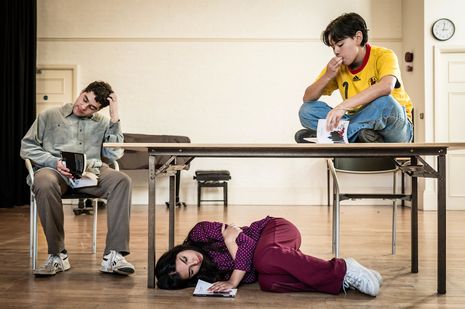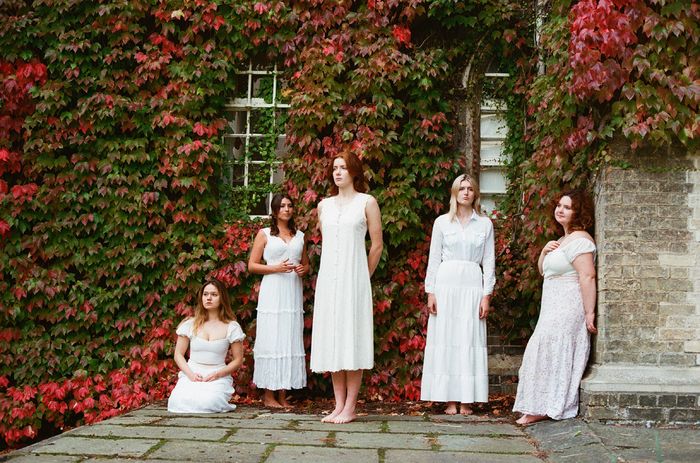Stellar performances of sibling relationships struggle to raise the stakes in Tusk Tusk
Kate Austin finds the domestic drama buzzing with tension lacks the momentum to fulfil its potential

A well-known sight of a cluttered living room. An unlit lightbulb dangling over the space. The scene is set, and it looks very familiar. It’s only once this play’s curious drip feeding of information begins that you realise this is more complex than a story about moving house.
The strength of this Lord-of-the-Flies-esque domestic drama lies in its second act. The sharp twists between comedy and heightened emotion are drawn out by the darker, more atmospheric shifts approaching the play’s climax. Playing Eliot, Jake Leigh’s externalisation of disturbing delusion, anger and desperation is particularly effective in portraying a deliberate vulnerability which never veers into complete sympathy. His interactions with confident love interest Cassie (Orla Hill) bring out a nastier side of the character in comparison to Hill’s heartfelt feminist outpour, gently balancing contempt with a sense of dignity. Director Gabriella Shennan succeeds in presenting themes around gender, both here and in the play’s key sibling relationship between Eliot and Maggie; Arabella Alhaddad’s (Maggie) haunting monologues in the closing scene are key standout moments.
The show’s ability to captivate in these carefully constructed monologues, however, left me feeling disappointed that the pacing and flow of the play as a whole was not plotted out in the same vein. At times, the dialogue feels stilted, and though a building tension found its way after the interval, it’s a shame that some arguments and intense conflicts lack a sense of drive. Despite some stellar performances, notably Mia Urwin’s (Finn) complete embodiment of a child’s physicality and hilarious comic relief, the play’s lack of forward momentum and progression sometimes leaves the audience at a loss.
“Mia’s childlike naivety, high energy levels and brilliant facial expressions demonstrates a success here”
Nonetheless, the comedy is certainly worth mentioning. The creation of convincing child characters is no easy feat and the audience’s laughter at Mia’s childlike naivety, high energy levels and brilliant facial expressions demonstrates a success here. The play’s punctuation of comedy is strong in its ability to undercut tension, and I would have liked to see the extent this could be taken to when the stakes feel higher.
While the set and lighting were effective in grounding the audience in a familiar domestic sphere, the blocking felt, at times, limited by a need to keep moving, navigating the set along the way. That being said, the set dressing in particular was key in generating the recognisable untidiness of moving house, and there was a clear and consistent use of space to establish offstage location. Martha Shaylor’s costume forged the connection between the two older siblings, interestingly not displaying much noticeable difference between their two appearances. This added a noteworthy dimension to Maggie’s need to play at being mother, as the two siblings were visually on par.
Tusk Tusk has a potential that I really wanted to be compelled by. The sibling relationships are genuinely enjoyable to watch play out, but the effectiveness of their characterisation is at times held back by a lack of focused momentum. I would have liked to see all the show’s successes – a sensitive engagement with gender, the ebbs and flows of Leigh’s character and the comedy – be pushed further by a greater consideration for timing and build. Yet when the tension comes into its own, so does this production.
Tusk Tusk runs from the 3rd to the 5th of November in Robinson College Auditorium.
 News / Colleges charge different rents for the same Castle Street accommodation2 March 2026
News / Colleges charge different rents for the same Castle Street accommodation2 March 2026 News / King’s hosts open iftar for Ramadan3 March 2026
News / King’s hosts open iftar for Ramadan3 March 2026 Theatre / Lunatics and leisure centres 4 March 2026
Theatre / Lunatics and leisure centres 4 March 2026 News / Angela Merkel among Cambridge honorary degree nominees27 February 2026
News / Angela Merkel among Cambridge honorary degree nominees27 February 2026 News / News in Brief: waterworks, wine woes, and workplace wins 1 March 2026
News / News in Brief: waterworks, wine woes, and workplace wins 1 March 2026








